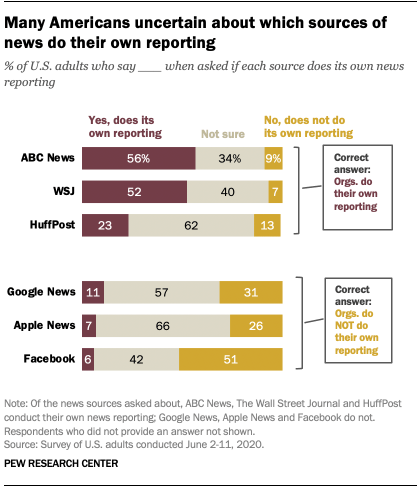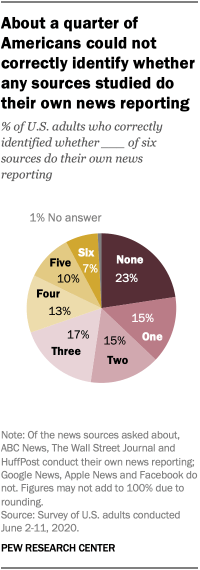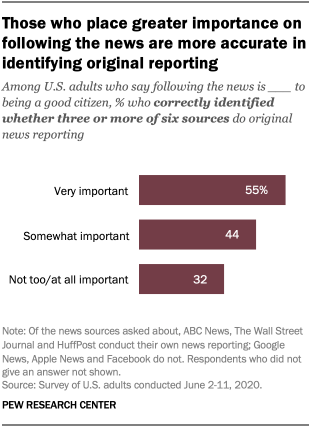The digital age has given rise to new and diverse ways of accessing news, ranging from news aggregators and social media feeds that simply circulate existing content to news organization websites that publish their journalists’ original work. And a new Pew Research Center survey finds many Americans have difficulty in distinguishing sources that do their own reporting from those that don’t.
The survey, conducted June 2-11, 2020, asked whether six sources of news conduct their own news reporting – ranging from organizations that do original news reporting such as ABC News, The Wall Street Journal and HuffPost to online sources that only gather articles from elsewhere such as Facebook, Google News and Apple News.
Roughly half of Americans or more were able to correctly identify whether three of the six sources do their own reporting: ABC News (56%), The Wall Street Journal (52%) and Facebook (51%). At the same time, though, fewer than four-in-ten were able to correctly answer whether Google News (31%), Apple News (26%) or HuffPost (23%) do their own news reporting. (The survey was conducted before BuzzFeed acquired HuffPost.)
To examine Americans’ news consumption habits in an era of rapidly evolving media technology, we surveyed 2,021 U.S. adults on Ipsos’ KnowledgePanel (KP). Ipsos’ KP is a probability-based web panel designed to be representative of adults in the U.S. The survey was carried out from June 2 to June 11, 2020, in both English and Spanish among a sample of 3,715 noninstitutionalized U.S. adults ages 18 years and older. Of these, the 2,021 respondents constituted a general population sample and were weighted to be representative of the U.S. adult population. Results here are reported based on this general population sample of 2,021 respondents. Read more about the KP’s methodology.
Here are the questions used for this analysis, along with responses, and its methodology.
This analysis was made possible by The Pew Charitable Trusts, which received support from the John S. and James L. Knight Foundation.
Uncertainty was common, even for the sources that Americans found easier to classify. About a third or more of respondents were not sure whether each of the sources conducts its own news reporting, with Apple News at the high end (66% not sure) and ABC News at the low end (34% not sure).
All in all, nearly a quarter of Americans (23%) could not correctly identify whether any of the six sources do original reporting, and an additional three-in-ten got only one (15%) or two (15%) questions right. The remaining 47% correctly identified three or more sources, though just 7% correctly identified all six.
Americans seem to be at least somewhat aware of this uncertainty. Before asking about the six news sources, the survey asked respondents how confident they are in their ability to identify original reporting. Just 9% of U.S. adults said they feel “very confident” they can differentiate between organizations that do original news reporting and those that do not. Another 46% said they are pretty confident, but the remainder were either not too (35%) or not at all (8%) confident they can spot original news.
The level of confidence Americans have in their own ability to identify original news reporting lines up well with their success in answering questions about the six news sources.
Among those who answered three or more questions correctly, at least 60% said they are confident they can identify original reporting. Six-in-ten of those who answered three correctly and 81% of those who answered all six correctly said they feel at least pretty confident in their ability to identify original reporting. In comparison, 33% of those who correctly answered none of the original reporting questions said they feel confident, and the remainder said they feel not too (47%) or not at all confident (18%).
Some demographic differences also emerge on answers to the question about original news reporting. More than twice as many college graduates correctly identified three or more of the sources (66%) when compared with those with a high school diploma or less (30%). Those with annual household incomes of $75,000 or more were also twice as likely as those who make $30,000 or less to correctly identify at least half of the sources (58% vs. 29%, respectively).
Adults ages 65 and older tended to answer fewer of the original reporting questions correctly, struggling in particular with the newer online sources (HuffPost, Facebook, Google News and Apple News).
When it comes to confidence in the ability to identify sources that do original reporting, there are a few demographic differences as well. Notably, 60% of men, compared with 51% of women, express confidence. Younger adults are also somewhat less confident than older adults that they can identify original reporting. About half (47%) of Americans ages 18 to 29 are confident in their ability to identify original reporting – less than all other age groups: ages 30 to 49 (55%), 50 to 64 (59%) and 65 and older (60%).
More Democrats (62%) are confident in their ability to identify original reporting compared with Republicans (50%). They were also more likely to correctly identify that ABC News, The Wall Street Journal and HuffPost do their own news reporting, which may be due in part to Republicans’ greater mistrust of the news media.
News consumers who place more value on the news are also better at identifying which sources do their own reporting.
The survey asked respondents how important following the news was for being a good citizen, and those who say following the news is “very important” are more likely to correctly answer whether three or more of the six sources conduct their own news reporting. Over half of those who say following the news is very important (55%) correctly answered three or more of the original reporting questions, compared with 44% of those who say following news is somewhat important and 32% of those who say it is not too or not at all important.
This trend is equally stark when looking at the individual sources: Those who place the greatest amount of importance on following the news were 11 to 18 percentage points more likely than those who place less importance on keeping up with the news to correctly identify that ABC News (18 points more likely), the Wall Street Journal (+18 points) and HuffPost (+11 points) do their own news reporting.
Though the differences are smaller for the remaining sources, those who place high importance on the news are also more likely than their counterparts to correctly identify that Facebook and Google News do not do original reporting. For Facebook, 56% of those who say following the news is very important also correctly said the social media site does not do its own reporting, compared with 47% of those who place less importance on news – a gap of 9 percentage points. About a third of those who place high importance on the news (36%) rightly said that Google News does not do original reporting, versus 27% of those who place less importance – another 9-point gap.
Those who follow the news more closely – who are more likely to be college graduates and have higher income – were also better at identifying original reporting.
Note: Here are the questions used for this analysis, along with responses, and its methodology.




